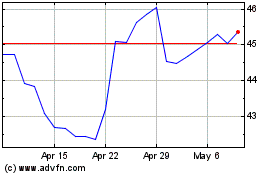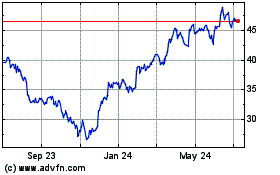By Eric Sylvers
GENEVA -- General Motors Co.'s unconventional view of the
European auto industry will likely remain just that --
unconventional.
Senior executives gathered at this week's Geneva auto show
signaled commitment to the world's third-largest auto market after
GM's sale of Adam Opel AG, saying Europe actually isn't a bad place
to sell cars. While margins typically are lower than North America
and China, and closing a plant is often viewed as a politically
incorrect move, "a well-managed company can make a decent return on
its investment in Europe," Renault SA Chief Executive Carlos Ghosn
said at a news conference Tuesday.
European governments own stakes in several national auto makers,
including Renault and German auto giant Volkswagen AG, representing
a potential hurdle for executives aiming to make significant
changes. GM has long battled German unions and it has been unable
to push the same deep concessions it forced on the United Auto
Workers in the U.S. over the past 12 years.
Mr. Ghosn was one of several auto chiefs to express surprise at
GM's move. "We need to be patient," he said. "That's why I'm amazed
to see some auto makers getting out of key markets."
Unlike Renault and many of the other auto makers competing in
Europe, GM has been unable to earn money during a four-year rebound
taking place in Europe. One of the few companies to close a factory
in the region in recent years, GM has incurred losses totaling $15
billion in Europe since 2000, including a $300 million loss last
year that led the company to report a rare miss on a profit target
set by Chief Executive Mary Barra.
Peugeot SA of France said Monday it struck a EUR2 billion ($2.12
billion) deal to buy Opel, its Vauxhall sister brand and Opel's
finance company. GM said a shift in focus to other markets, as well
as the steep investments needed to meet European Union regulations
and narrow product tastes, prompted the deal.
Peugeot CEO Carlos Tavares said some of the blame for GM's
continued losses can be chalked up to an excessive focus on its
home market and failure to tweak models in seemingly mundane ways
to confront the peculiarities of different European countries. That
is the same criticism levied at many European companies --
including Volvo Car Corp. and Volkswagen -- that don't overhaul
their Euro-focused cars for the U.S. market.
Said Volvo CEO Håkan Samuelsson: "I got the impression Opel has
tried to be more premium and it didn't work."
Mr. Samuelsson has overseen a remaking of the Swedish brand in
recent years, working with Chinese owners to create higher-end
sport-utility vehicles that appeal to U.S. consumers.
Mr. Tavares, a former lieutenant of Mr. Ghosn in the Renault
alliance with Nissan Motor Co., took over Peugeot in 2013, trimming
the workforce and slashing production to steer clear of bankruptcy
protection and return to profitability. He said the home field is
only going to get tougher.
"The European market is becoming more and more specific in terms
of customer needs, in terms of regulations, in terms of trends,"
Mr. Tavares said Tuesday. "Even in politics, it's specific and you
need to deal with that if you want to create a sense of calm and
focus inside of the company."
Mr. Tavares made sure he had the French, German and British
governments on his side as he negotiated to seal the deal to buy
Opel.
"We understand that it is a challenge for GM to understand
Europe," said Mr. Tavares who lauded GM for continuing to invest
heavily in Opel even as the losses continued to accumulate. "Let's
put ourselves in their shoes looking at Europe from the outside.
It's not always easy to understand what is happening [in
Europe]."
Ford Motor Co., with slightly more market share than GM, figured
it out. After suffering a string of losses after the European
market collapsed, the Dearborn, Mich., company turned in
back-to-back profits in 2015 and 2016, including $1.2 billion last
year.
Jim Farley, CEO Ford Europe, said that to be profitable in
Europe "you have to be smart, selective where you compete, and
disciplined with costs." Ford's cost cuts in Europe have included
moving "knowledge work" to Romania from Germany.
GM executives said that political events, including the U.K.'s
exit from the European Union, led to the most recent losses and the
decision to leave Europe, which represents about 20% of the world's
car sales. GM, the No. 3 auto maker in terms of global volume,
relied on Europe for more than 10% of sales.
Sergio Marchionne, CEO of Fiat Chrysler Automobiles NV, said he
was "shocked out of my pants" to see a note mentioning geopolitical
risks in Europe as part of a GM presentation announcing the Opel
sale.
"I've heard Europe described in a variety of fashions, but
describing the old continent as posing geopolitical risks to a
multinational, I think we are bit stretching the thing out of
proportion," Mr. Marchionne said.
To be sure, Europe remains a challenging place to earn money
selling cars. Ford and Fiat Chrysler are much more profitable in
North America, where trucks and SUVs are popular. Renault gets most
of its profit from the stake it holds in Nissan.
Mr. Marchoinne said profitability in Europe is held back because
companies haven't managed to slash production capacity -- and jobs
-- in the region as the Detroit 3 did in the U.S. during the
financial crisis that pushed GM and Chrysler into bankruptcy. "We
can't have that discussion in Europe, which is why this thing is
politically complicated."
--Chester Dawson and William Boston contributed to this
article.
(END) Dow Jones Newswires
March 07, 2017 16:55 ET (21:55 GMT)
Copyright (c) 2017 Dow Jones & Company, Inc.
General Motors (NYSE:GM)
Historical Stock Chart
From Mar 2024 to Apr 2024

General Motors (NYSE:GM)
Historical Stock Chart
From Apr 2023 to Apr 2024
